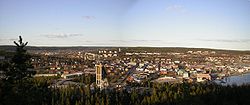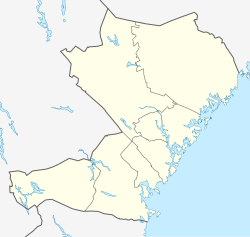Ornskoldsvik
| Örnsköldsvik | |
|---|---|

Örnsköldsvik in 2005
|
|
| Nickname(s): Ö-vik, Foppaland | |
| Coordinates: 63°17′27″N 18°42′56″E / 63.29083°N 18.71556°ECoordinates: 63°17′27″N 18°42′56″E / 63.29083°N 18.71556°E | |
| Country | Sweden |
| Province | Ångermanland |
| County | Västernorrland County |
| Municipality | Örnsköldsvik Municipality |
| Area | |
| • City | 24.40 km2 (9.42 sq mi) |
| • Metro | 6,420.97 km2 (2,479.15 sq mi) |
| Elevation | 18 m (59 ft) |
| Population (31 December 2010) | |
| • City | 28,991 |
| • Density | 1,188/km2 (3,080/sq mi) |
| • Metro | 55,284 |
| Time zone | CET (UTC+1) |
| • Summer (DST) | CEST (UTC+2) |
| Postal code | 89x xx |
| Area code(s) | (+46) 660 |
| Climate | Dfc |
| Website | www |
Örnsköldsvik [œɳɧœldsˈviːk] is a locality and the seat of Örnsköldsvik Municipality in Västernorrland County, Sweden, with 28,991 inhabitants in 2010.
Its natural harbour and archipelago is in the Gulf of Bothnia and the northern boundaries of the High Coast area. It is well known as an exporter of pulp and paper products and heavy machinery goods. It has a strong environmental record and is the "testbed" for ethanol powered cars.
Traces of human activity in the Örnsköldvik area date back to the Nordic Bronze Age and there is a reconstructed Roman Iron Age village called Gene fornby that is a popular tourist attraction just outside the town.
However, Örnsköldsvik itself is a relatively young city; it was founded as a köping (a Swedish market town) in 1842 and became a city in 1894. Its name originates with the surname of governor of Västernorrland County from 1762–9, Per Abraham Örnsköld, and means "Örnsköld's Bay". The surname Örnsköld literally means "Eagle Shield".
The town of Örnsköldsvik is the centre of Örnsköldsviks Kommun or Örnsköldsvik Municipality. The Municipality has a much larger population than the town itself, at over 55,000 inhabitants, as the municipality is vast with very large forest areas, and consists of several rural communities.
Historically, the most important economic activity was trade and heavy industry. In the surrounding villages (now incorporated into the city itself) two major industrial ventures arose: Modo, a pulp, paper, and logging enterprise now known as Holmen, and Hägglunds, a heavy industrial company
...
Wikipedia


